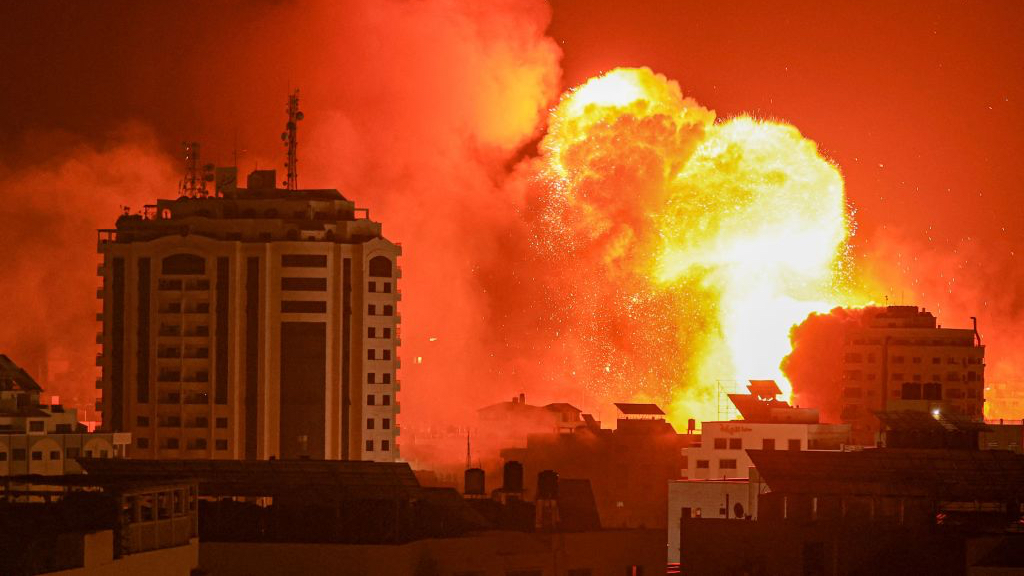Israel orders 'complete siege' of Gaza, with food, water and energy cut off
As Israel vows crushing retaliation for Hamas' invasion, Hamas threatens to kill its hostages


A free daily email with the biggest news stories of the day – and the best features from TheWeek.com
You are now subscribed
Your newsletter sign-up was successful
As Israel and Palestinian militants continued battling into a fourth day after Hamas launched a brutal surprise attack Saturday morning, Israeli Defense Minister Yoav Gallant said Monday he had ordered a "complete siege" of the Gaza Strip, with "no electricity, no food, no water, no fuel" allowed into the Palestinian territory. As of early Tuesday, Israel's death toll stood at more than 900 while Gaza authorities said nearly 700 Palestinians have been killed.
Prime Minister Benjamin Netanyahu, who formally declared war on Hamas on Sunday, said in a televised speech Monday that Israel has "only started striking Hamas," adding, "What we will do to our enemies in the coming days will reverberate with them for generations." A spokesman for the military wing of Hamas, which also rules Gaza, said the Palestinian militants would execute some of their estimated 150 Israeli hostages every time Israel struck Gazans "in their homes without warning."

President Biden and the leaders of Britain, France, Germany and Italy issued a joint statement last Monday condemning "Hamas and its appalling acts of terrorism."
The Week
Escape your echo chamber. Get the facts behind the news, plus analysis from multiple perspectives.

Sign up for The Week's Free Newsletters
From our morning news briefing to a weekly Good News Newsletter, get the best of The Week delivered directly to your inbox.
From our morning news briefing to a weekly Good News Newsletter, get the best of The Week delivered directly to your inbox.
Israel has been blockading Gaza's two shared land borders and its Mediterranean coast for 16 years. A siege would spell "utter disaster" for Palestinian civilians, Jan Egeland, secretary general of the Norwegian Refugee Council, told The Associated Press. "There is no doubt that collective punishment is in violation of international law." Egypt, which shares Gaza's fourth border, will allow medical and food aid to pass through the small Rafah border crossing, AP reported, citing an Egyptian military official.
Israel has called up 300,000 reservists, and its forces amassed near the Gaza Strip border suggest a ground invasion could be in the works. Its fighter jets have already destroyed housing blocks and water and communications infrastructure, struck a market where Gazans were stocking up on food, and razed four mosques in the Shati refugee camp, The New York Times reported. Israel said the mosques were hiding Hamas fighters or infrastructure.
A free daily email with the biggest news stories of the day – and the best features from TheWeek.com
Peter has worked as a news and culture writer and editor at The Week since the site's launch in 2008. He covers politics, world affairs, religion and cultural currents. His journalism career began as a copy editor at a financial newswire and has included editorial positions at The New York Times Magazine, Facts on File, and Oregon State University.
-
 Political cartoons for February 16
Political cartoons for February 16Cartoons Monday’s political cartoons include President's Day, a valentine from the Epstein files, and more
-
 Regent Hong Kong: a tranquil haven with a prime waterfront spot
Regent Hong Kong: a tranquil haven with a prime waterfront spotThe Week Recommends The trendy hotel recently underwent an extensive two-year revamp
-
 The problem with diagnosing profound autism
The problem with diagnosing profound autismThe Explainer Experts are reconsidering the idea of autism as a spectrum, which could impact diagnoses and policy making for the condition
-
 Epstein files topple law CEO, roil UK government
Epstein files topple law CEO, roil UK governmentSpeed Read Peter Mandelson, Britain’s former ambassador to the US, is caught up in the scandal
-
 Iran and US prepare to meet after skirmishes
Iran and US prepare to meet after skirmishesSpeed Read The incident comes amid heightened tensions in the Middle East
-
 Which way will Trump go on Iran?
Which way will Trump go on Iran?Today’s Big Question Diplomatic talks set to be held in Turkey on Friday, but failure to reach an agreement could have ‘terrible’ global ramifications
-
 Israel retrieves final hostage’s body from Gaza
Israel retrieves final hostage’s body from GazaSpeed Read The 24-year-old police officer was killed during the initial Hamas attack
-
 China’s Xi targets top general in growing purge
China’s Xi targets top general in growing purgeSpeed Read Zhang Youxia is being investigated over ‘grave violations’ of the law
-
 Panama and Canada are negotiating over a crucial copper mine
Panama and Canada are negotiating over a crucial copper mineIn the Spotlight Panama is set to make a final decision on the mine this summer
-
 Why Greenland’s natural resources are nearly impossible to mine
Why Greenland’s natural resources are nearly impossible to mineThe Explainer The country’s natural landscape makes the task extremely difficult
-
 Iran cuts internet as protests escalate
Iran cuts internet as protests escalateSpeed Reada Government buildings across the country have been set on fire
